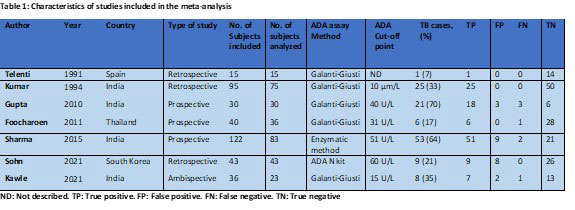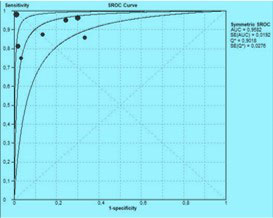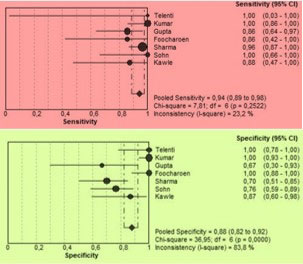Session Information
Session Type: Poster Session B
Session Time: 9:00AM-10:30AM
Background/Purpose: Adenosine deaminase (ADA) activity has shown good performance in diagnosing pleural, peritoneal, and meningeal tuberculosis. This study aimed to evaluate the performance of measuring ADA activity in synovial fluid for the early diagnosis of joint tuberculosis.
Methods: We performed a meta-analysis to determine the performance of ADA measured in synovial fluid for the diagnosis of joint tuberculosis. We searched published information in MEDLINE, Embase, Cochrane Library, Web of Science, and MedRxiv databases, as well as unpublished information in the American College of Rheumatology and European League
Against Rheumatism for conference abstracts (2012-2021). We also scanned the reference lists of articles. Two reviewers independently applied the criteria for selection, assessed quality, and extracted data.
Results: Seven independent studies (N= 305 subjects) that compared ADA activity in synovial fluid with a composite reference diagnostic method for tuberculosis were included. Overall, the risk of bias was judged low. Studies were classified as high quality (n=3; 148 subjects) and low quality (n= 4; 157 subjects). The cut-off values of ADA for diagnosing tuberculosis ranged from 15 to 60 IU/L, being the median value between 40-50 IUL/L.
Pooled sensitivity and specificity of ADA activity was 94% (95% confidence interval [CI], 0.89-98; I2=23%) and 88% (95% CI, 83-92; I2= 83%), respectively. The random-effects model for pooled diagnostic Odds ratio was 67.1 (95%CI, 20.3-222.2; I2=30%). The area under the receiver operating characteristic curve was 0.96 (95% CI, 0.92-0.99). Metaregression did not identify the quality of the study, country of publication, or the type of assay as a source of heterogeneity.
Conclusion: In summary, measuring the activity of adenosine deaminase in synovial fluid is easy, cheap, and available in areas with poor resources. Adenosine deaminase activity values above the cutoff point add significant diagnostic information to start empirical treatment against tuberculosis while waiting for synovial fluid Lowenstein culture results. Adenosine deaminase activity in synovial fluid can be used as an additional tool for the diagnosis of tuberculosis joint infection in cases of negative results from nucleic acid amplification methods.
To cite this abstract in AMA style:
Cortés-Quiroz J, Ena J, Bernal J, Rosas J. Performance of Adenosine Deaminase Activity in Sinovial Fluid for the Early Diagnosis of Tuberculous Arthritis: A Meta Analysis [abstract]. Arthritis Rheumatol. 2022; 74 (suppl 9). https://acrabstracts.org/abstract/performance-of-adenosine-deaminase-activity-in-sinovial-fluid-for-the-early-diagnosis-of-tuberculous-arthritis-a-meta-analysis/. Accessed .« Back to ACR Convergence 2022
ACR Meeting Abstracts - https://acrabstracts.org/abstract/performance-of-adenosine-deaminase-activity-in-sinovial-fluid-for-the-early-diagnosis-of-tuberculous-arthritis-a-meta-analysis/



